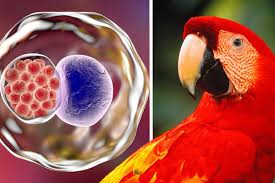
Cases of a disease called psittacosis are on the rise in Europe, where five people have recently died from the illness, according to a statement from the World Health Organization (WHO) released 5 March.
Chlamydia psittaci is a type of bacteria that often infects birds. Less commonly, these bacteria can infect people and cause a disease called psittacosis.
Psittacosis in people is most commonly associated with pet birds, like parrots and cockatiels, and poultry, like turkeys and ducks.
The bacteria can infect people exposed to infected birds. It is important to know that infected birds do not always show signs of disease or seem sick. Both sick birds and infected birds without signs of illness shed the bacteria in their droppings and respiratory secretions. When the droppings and secretions dry, small dust particles (that include the bacteria) can get into the air. The most common way someone gets infected is by breathing in the dust from these dried secretions. Less commonly, birds infect people through bites and beak-to-mouth contact.
In general, people do not spread the bacteria that cause psittacosis to other people. However, this may be possible in rare cases. There is no evidence that the bacteria spread by preparing or eating poultry.
People of all ages can get psittacosis, but it is more commonly reported among adults. Those who have contact with pet birds and poultry, including people who work in bird-related occupations, are at increased risk:
-Bird owners
-Aviary and pet shop employees
-Poultry workers
-Veterinarians
In general, psittacosis is a mild illness. The most common symptoms include:
-Fever and chills
-Headache
-Muscle aches
-Dry cough
The signs of C. psittaci infection in birds are non-specific and include:
-Poor appetite
-Inflamed eyes
-Breathing difficulty
-Diarrhea
Infected birds may not have signs of disease or seem sick. When birds have symptoms caused by C. psittaci infection, veterinarians call the disease avian chlamydiosis.
Most people begin developing signs and symptoms within 5 to 14 days after exposure to the bacteria (Chlamydia psittaci). Less commonly, people report symptoms starting after 14 days.
People diagnosed with psittacosis usually take antibiotics to treat the infection. Most people improve quickly if they start antibiotics soon after they get sick.
Most people treated properly for psittacosis make a full recovery. However, some people have serious complications and need care in a hospital.
Complications include:
-Pneumonia (lung infection)
-Endocarditis (inflammation of the heart valves)
-Hepatitis (inflammation of the liver)
-Inflammation of the nerves or the brain, leading to neurologic problems
With appropriate antibiotic treatment, psittacosis rarely (less than 1 in 100 cases) results in death.